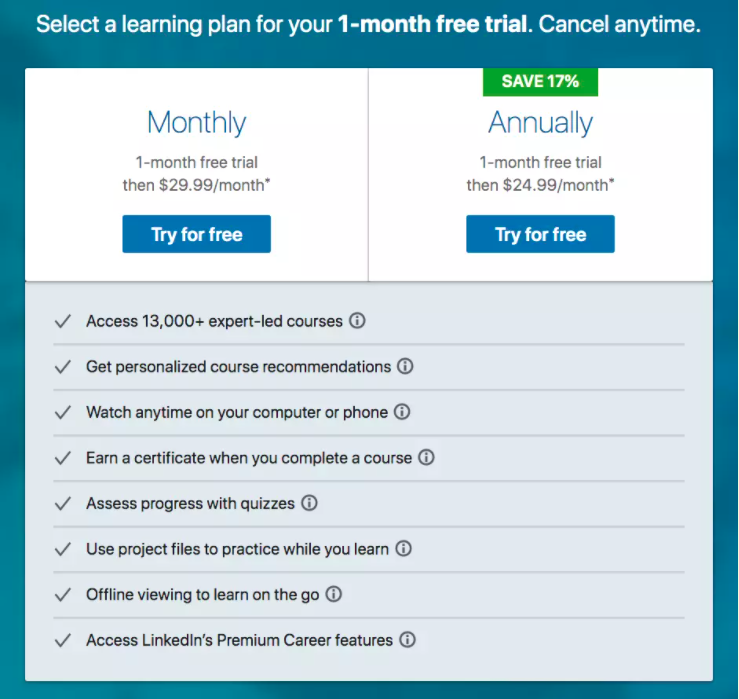A Transparent Review
LinkedIn Learning is one of many online learning platforms crowding the marketplace. The choices can be downright overwhelming. Many MOOC (Massive Open Online Courses) platforms have high-quality course offerings, which only makes the decision harder. Our LinkedIn Learning review makes that decision easy-peasy.
The key to choosing the best online learning platform for you is understanding that every company has its own specialties, then aligning yourself according to your niche and goals.
The purpose of this article is to give a refreshingly honest, in-depth review of LinkedIn Learning. We cover how the platform works, a breakdown of the pros and cons, monthly costs, if LinkedIn Learning is worth it, and whether it’s right for you.
In the spirit of radical transparency, we also discuss similar eLearning platforms and who should use them instead of LinkedIn. Finally, we give a rundown of some of the best courses available on the platform.
Table of Contents
My LinkedIn Learning Review Experience
I completed 12 courses, totaling dozens of learning hours.
Some of my courses covered Career Development and Business, the two areas where the platform stands out. I also took courses on SEO and Content Marketing, two areas of personal expertise, to understand the quality of the information.
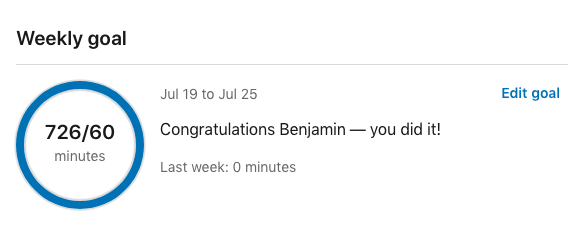
I’ve also read dozens of in-depth LinkedIn Learning reviews and Quora forums to understand how many people think LinkedIn Learning is worth the monthly subscription.
I’m certain this is hands-down the best LinkedIn Learning review available for 2020.
Key Takeaways (TLDR)
- LinkedIn Learning is absolutely worth it for active job seekers, potential or active LinkedIn Premium users, and ProFinder Freelancers. It’s the best platform for courses in career development, business, and soft skills.
- The platform has affordable pricing, binge-worthy videos, excellent production value, a user-friendly interface, and a widely recognized brand. Difficult topics like blockchain mechanics are easy to follow.
- There are better online course markets for academic, tech, and creative topics. The advanced courses are not truly advanced.
Pros and Cons Breakdown
LinkedIn Learning Pros
1. Access to LinkedIn Premium
LinkedIn Learning is one of the benefits of LinkedIn Premium. For that reason, it’s got a leg up on other platforms for anyone who finds value in the Premium subscription.
In most cases, this includes active job seekers, LinkedIn ProFinder freelancers, and people who use LinkedIn heavily, whether for networking, content sharing, or recruiting.
The features are listed below under the “Is LinkedIn Learning Worth It?” section.
2. One-Month Free Trial
At this point, this is fairly standard for online learning platforms. But there’s no tricks. You can cancel the trial immediately, and you receive an email one week before the trial ends.
3. Affordable Pricing
At $29.99 per month (or $239.88 for an annual subscription paid upfront), the platform is a good price point for the value.
| Course Platform | Specialization | Cost |
|---|---|---|
| LinkedIn Learning | Business, Creative, Technology | $29.99 per month, or $239.88 per year |
| Skillshare Premium | Design, Creative, Business | $15 per month |
| Udemy | Business, Design,Tech | $10-$199 per course |
| Codecademy | Coding | Free courses, but $$50-100 per certificate |
| Edx | Academic | Free courses, but $$50-100 per certificate |
| Coursera | Academic | $39-79 per month for course tracks |
| Pluralsight | Tech, especially Coding | $29.99 per month |
| Thinkful | Coding | $3250 per month |
| BitDegree | Business, Design, Tech | Some free courses, plus a BitDegree currency system |
| Khan Academy | Academic | Free |
| Data Camp | Coding | $25 per month for standard, $33.25 per month for premium |
4. Binge-worthy Videos
Many courses offer numerous videos that last 1-10 minutes. For that reason, they are easier to consume than chocolates on a park bench. Another benefit to this setup is that you can sneak in a couple videos while on your lunch break or during your commute.
5. Excellent User Interface
Apart from the personalized algorithm, you can also browse courses according to topic or use the search feature. Or follow Learning Paths, which collect related courses into a thoughtful sequence. This ensures you don’t deal with overlapping content.
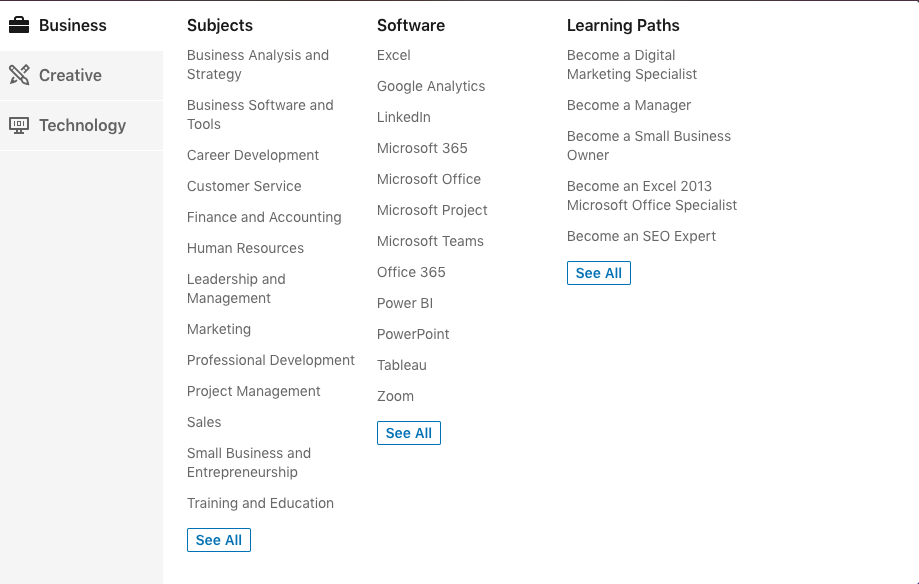
6. Difficult topics are easy to follow.
I took a course on the mechanics of blockchain, a topic which I have tried to understand before, but without success. However, this course made a tough (and for me, pretty boring) subject simple and digestible.
7. You can contact the expert instructors.
Many of the teachers are business leaders, trusted consultants, PhDs, and best-selling authors. Interviewees include some of the biggest names on earth, from Bill Gates to Oprah. The instructors have loads of practical experience, which translates to clear lessons and actionable advice.
Here’s the kicker—many teachers also have LinkedIn profiles, so it’s easy to contact them with follow-up questions. You can do this directly on the platform under the Q&A feature. If you find a way to offer value in return, you’ve got the start of a powerful networking method.
8. Recognizable Brand Name
In other words, it’s better for self-marketing on your resume. It’s true that Future Learn has some great courses, but most potential employers won’t recognize the brand.
No recruiter will stop shuffling through 150 resumes to research an unknown online course platform. The better scenario is to take courses from eLearning companies that employers will recognize and trust.
LinkedIn Learning Cons
1. Some courses have thin content.
Fluff is the worst. Paying subscribers should never reach the end of a 45 minute with zero takeaways. There should have been several points worth writing down, a few A-HA moments, and a flipped perception or two.
During my LinkedIn Learning review sessions, some courses left me feeling like I wasted time. To me, that’s a major letdown. If you’re in the game of getting people to listen to you, then you better have something meaningful to say.
I suppose the benefit is that you can just jump to another course. No harm, no foul. But a better version of the platform would ensure this almost never happens.
2. Mediocre advanced courses
I took advanced SEO and content marketing courses, two areas where I’m an expert. The content was, well…entry level.
Telling compelling stories is not advanced content marketing. Understanding search intent is basic, basic, basic SEO. I’m thirsty for advanced courses on these subjects, so it’s annoying when a course doesn’t deliver on the promise of its title.
3. Second-rate tech, creative, and academic courses
It’s not that the courses are terribly mediocre. If you already have a subscription for developing your soft skills, it can be worth checking out the Photoshop courses.
But compared to other platforms, the tech and creative course topics are unexceptional. Scroll down to find a table with the best online learning alternatives for these topics.
4. Minor User-Friendliness Issues
One example is that you can’t jump straight to the new content when courses are updated. You have to listen to the whole course again. Lame. But this is the kind of issue I expect will be solved in time.
5. No course reviews
One thing that’s amazing about sites like Udemy is that every course is heavily reviewed by past users. You understand the course value before you click play.
LinkedIn Learning courses do have tags like “Popular” or “Featured”. They also get likes and bookmarks, which often number in the thousands.
But there’s no space to criticize the courses. Ideally you should be able to read through low-star reviews for every course, as with Udemy below.
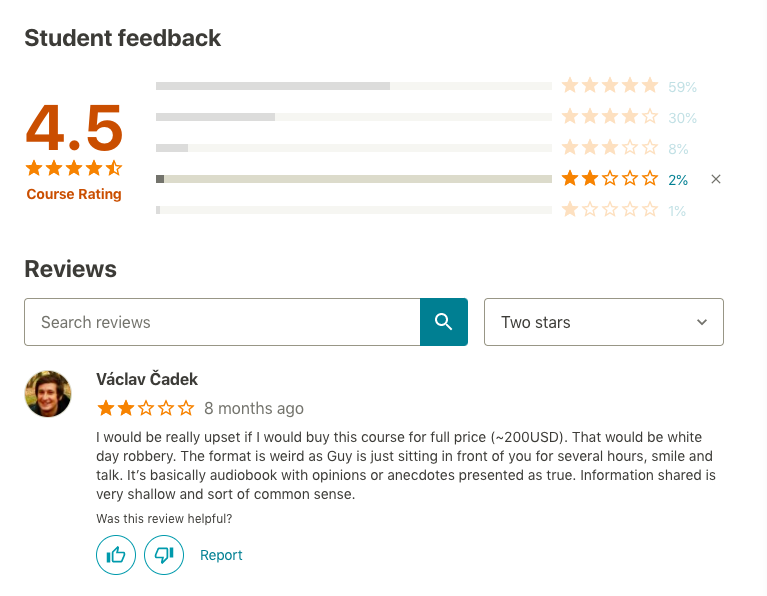
Other LinkedIn Learning Reviews
Some LinkedIn Learning Reviews say one drawback is that the courses don’t list their release date, which is incorrect. Many videos do show this information.
Other in-depth reviews find the categorization confusing, but personally I found it simple. You can use the search bar, browse by category and sub-category, use the personalized algorithm, or follow Learning Paths.
I found that most in-depth reviews overlooked many of the advantages. Or they simply didn’t spend enough time on the platform to see its unique benefits. On the other hand, I found most of the listed disadvantages on point.
Is LinkedIn Learning Worth It?
Are the Certificates Worth It?
Unlike other platforms, LinkedIn Learning does not charge you for a certificate or badge. Of course, it’s easy to display your certificates to your profile.
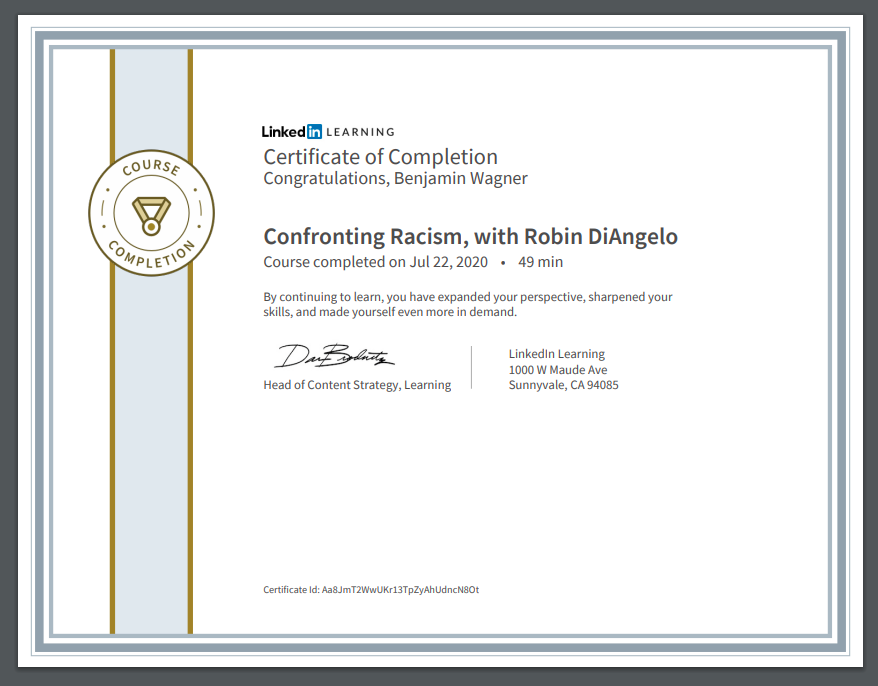
It’s also easy to download PDF versions of the certificates. They look clean and professional. Within a week of steady learning, you could have a zip file chock full of learning certificates. It definitely doesn’t hurt to have that in your back pocket when recruiters come knocking on your virtual door.
How Much Does LinkedIn Learning Cost?
It’s important to understand that you don’t pay exclusively for LinkedIn Learning. You pay $29.99 per month for LinkedIn Premium, which includes the online course platform.
Or you can save 33% by paying $265.67 upfront for an annual subscription. If you get the free trial month, this works out to $239.88 for the remaining 11 months. That’s a significant discount from the $359.88 annual price you would pay for the rolling monthly subscription.
Premium subscribers enjoy these benefits:
- The feature Who has viewed your profile
- 3 monthly InMails for members outside of your network
- Job Applicant Insights concerning competition and job skills
- Company Insights such as trends, hires and leadership changes
- Salary Insights so you can evaluate your opportunities
- Expert content on job preparation with top job interview questions
- And of course, unlimited access to all content from LinkedIn Learning.
LinkedIn Learning For Enterprises (Companies, Organizations, Teams)
No other review for LinkedIn Learning considers the value of the Enterprise option.
In the wake of COVID-19, over 50% of companies increased their Learning & Development initiatives.
“We switched our entire learning system for our company over to LinkedIn Learning, last year. It is our primary source for skills training, as well as for a lot of technical training, now. It is used for everything from basic customer service skills, to project management, to training for specific applications.” – Jason White, Sr End User Supt. Analyst
So, Is It Worth It?
In short, LinkedIn Learning is worth it if the platform is right for your specific niche and goals. Discover below if you fall in one of the sweet spots!
Is LinkedIn Learning Right For Me?
1. If you’re an active job seeker.
Employers understand that job hunting is full-time work. If you can demonstrate that you’ve taken several online skill courses while searching for employment, your resume will glow with ambition.
Imagine fielding the interview question, “Are you a hard worker?” by saying, “Yes, and I can prove it because I took LinkedIn courses in X, Y, and Z while between jobs, rather than viewing it as a vacation. I strengthened my skills, rather than let them atrophy.” Then wait for the look of approval on the interviewer’s face.
LinkedIn Premium is a worthwhile investment for anyone on the job market.
2. If you have or want a LinkedIn Premium account
LinkedIn Learning courses are generally superior to free online courses. The production, content, teachers, and guest speakers are impressive. If it makes sense for you to subscribe to LinkedIn Premium, then money-conscious learners should use LinkedIn Learning over subscribing to some other platform.
For example, if I wanted to learn to code in addition to LinkedIn Premium, then personally I’d use LinkedIn Learning over Codeacademy.
Why pay for an extra subscription to a great platform for coding when you’ve already got access to a really good one? However, if you’ve got money to spend, then definitely invest in yourself.
3. If you want to become more hireable
There’s no better online course market for learning how to land a job. Naturally, this area is LinkedIn’s specialty, and they leverage their expertise powerfully in their course offerings.
A few cool options include Find a Job in the Hidden Job Market, Learning Personal Branding, and How To Rock and Interview.
It’s also crucial to note that recruiters and headhunters prize soft skills like never before. LinkedIn Learning is among the very few platforms that respond with many courses that teach you how to flow through the quagmire of office relations.
Options like Confronting Racism, Body Language for Leaders, and Managing Your Career as an Introvert show how the platform is relevant and tuned in to the modern workplace.
4. If you want to take courses in business topics
The platform shines here for two reasons. First, business courses are a natural extension of LinkedIn’s expertise and resources. In other words, they create killer business content.
There are strong career development courses in topics like time management, communication, leadership, management, project management, and many more. Other online skill platforms have weaker course offerings in this field.
Second, many other mainstream eLearning platforms simply don’t offer very strong business courses. There are exceptions, like Harvard Online Courses, which are sometimes free. However, the offerings are fairly limited and courses typically last 4-16 weeks.
5. If you’re a ProFinder Freelancer
Freelancers can land gigs using LinkedIn ProFinder. Personally, I once landed a $9000 freelance writing job on the platform.
Syncing your LinkedIn profile with LinkedIn Learning and ProFinder is a great way to demonstrate your value in a single place. Potential clients who search for freelancers on ProFinder will certainly trust the LinkedIn brand to provide good online skill courses.
Be aware that the service costs $59.99 per month or $576 for an annual subscription. However, I paid over $3000 in Upwork fees last year, so $576 is relatively little compared to other freelancing platforms.
ProFinder allows new freelancers to send ten proposals free of charge. You also get a full refund if you cancel within 60 days.
Who Should Use Alternative Platforms?
Any honest review of LinkedIn Learning would be incomplete without introducing other options. This section explains who should use different eLearning platforms to get the most bang for their buck.
- Those with a passing or amateur interest in a subject should opt for free courses. There are many platforms providing excellent content without requiring a subscription.
- People who want to take traditional academic courses, for example in history or literature, are better off using other platforms like Coursera or Edx.
- Those who want to learn creative skills like photography, animation, or graphic design should check out Skillshare.
- People who want to learn tech skills, especially coding, machine learning, or data science should consider Udemy or DataCamp.
- Those who want to learn coding have many options, but you should consider Coursera or Codecademy for free courses, and perhaps Udemy for advanced paid courses.
- People who want to learn SEO should check out the amazing content online from big names like Ahrefs, Neil Patel, Google, and Backlinko that you should use them for a foundational understanding of search engine optimization.
Best LinkedIn Learning Courses
For broad strokes across all course topics, here’s a roundup of the 20 most popular courses for 2020.
Note: The links below only work if you’re logged in to your account. But I’ve collected a smattering of eye-catching course titles so you can understand what’s available.
Career Development Courses
- Career Advice from Some of the Biggest Names in Business – Beautifully shot, amazing and diverse lineup of mega-successful people from Richard Branson to Kevin Hart, and a pleasantly binge-able format of 50+ videos averaging 3 minutes.
- Confronting Racism – A best-selling race-relations author gives a sensitive and cool-headed look into a burning issue. This timely and thoughtful course offering demonstrates how the platform has its ear to the ground.
- Managing Your Career as an Introvert – A Duke professor that really gets introverts lays down career advice for people who recharge alone. His advice helps even the playing field for introverts in extrovert-driven environments.
- Connecting with Your Millennial Manager – A helpful course for older employees navigating a younger workplace.
Hireability Courses
- Find a Job in the Hidden Job Market – One of those rare pieces of content that actually delivers on the idea of revealing a secret. In this case, it’s the informational interview strategy. Check. It. Out.
- Learning Personal Branding – A relevant and upbeat course on how to turn yourself into a rainbow fish in a crowed sea of competition.
- How To Rock and Interview – A good introduction for people who’ve never had or nailed a job interview. However, it’s not an advanced class.
The Bottom Line (TLDR)
The conclusion of this LinkedIn Learning review is that it’s a powerful and valuable tool specifically for active job seekers, potential or active LinkedIn Premium users, and ProFinder Freelancers.
I have no trouble saying that it’s the best value platform for courses in career development, general business, and soft skills. So if those courses fit into your niche and goals, then go for it.
However, there are better eLearning platforms for academic, tech, and creative topics.


